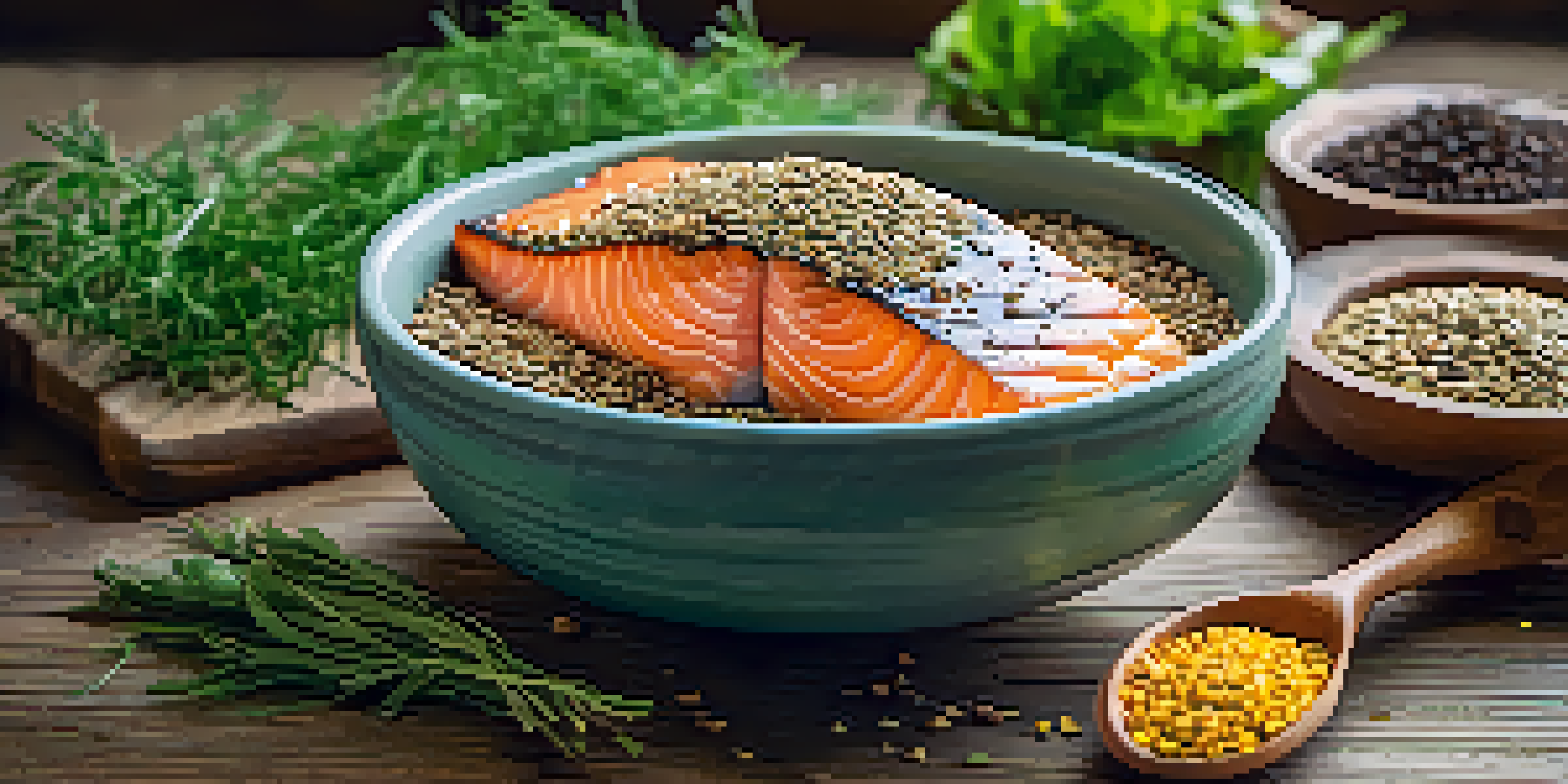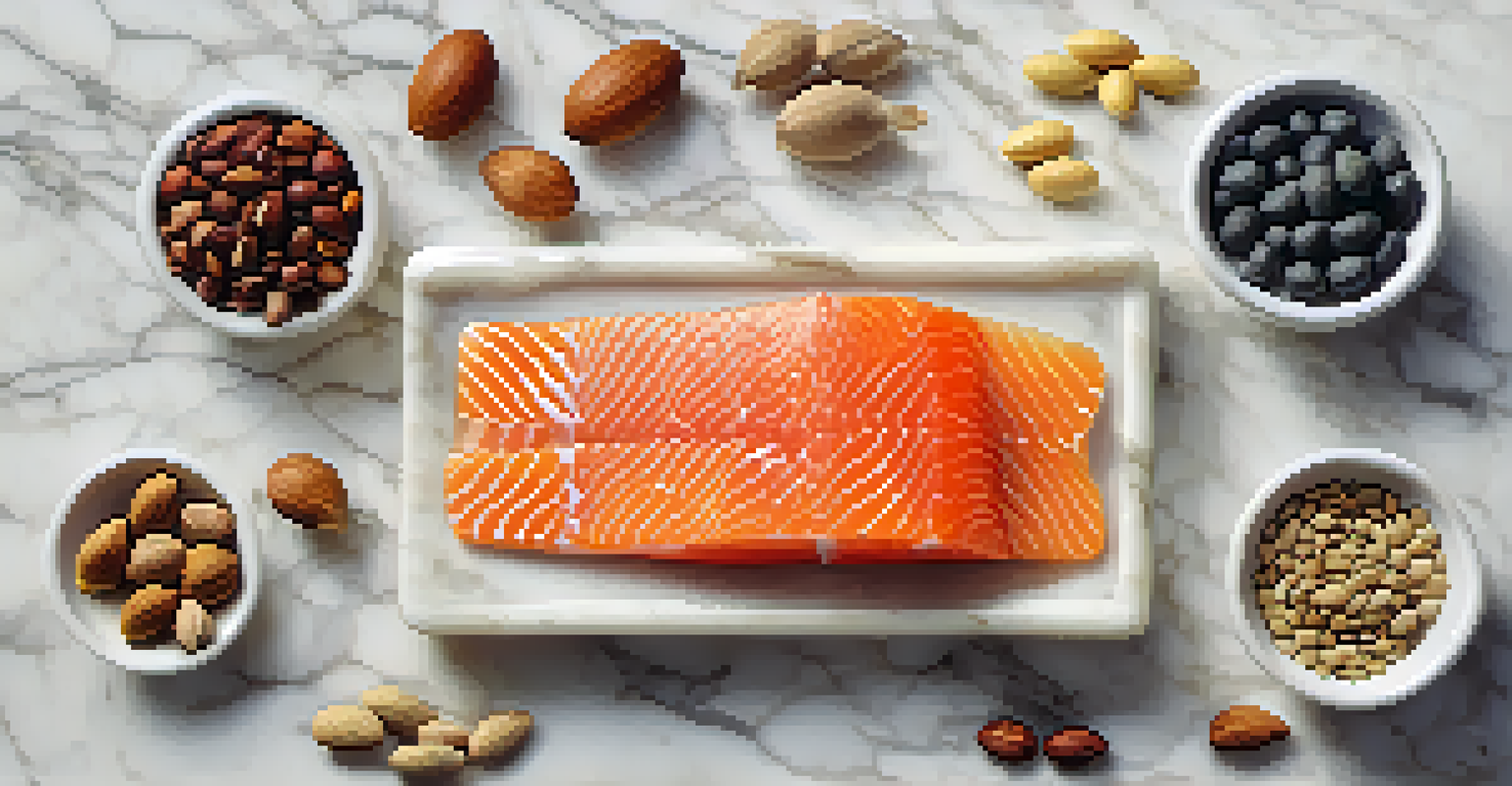The Importance of Omega-3 Fatty Acids in Your Diet

What Are Omega-3 Fatty Acids and Their Types?
Omega-3 fatty acids are essential fats that our bodies need but cannot produce on their own. They come in three main types: ALA (alpha-linolenic acid), EPA (eicosapentaenoic acid), and DHA (docosahexaenoic acid). ALA is primarily found in plant sources like flaxseeds and walnuts, while EPA and DHA are mostly found in fatty fish like salmon and sardines.
You are what you eat. What would you like to be?
These fatty acids play a crucial role in brain function, heart health, and overall well-being. Think of them as the building blocks of our cellular structure, helping to maintain the integrity of cell membranes. Incorporating these fats into your diet can lead to significant health benefits, making them an essential part of your nutrition.
In essence, Omega-3 fatty acids are like the oil that keeps your engine running smoothly. Without them, you may not perform at your best, both physically and mentally.
The Health Benefits of Omega-3 Fatty Acids
Omega-3 fatty acids are known for their myriad health benefits, including reducing inflammation and lowering the risk of chronic diseases. Studies suggest that these fats can help prevent heart disease by lowering triglyceride levels and improving overall cardiovascular health. They also play a role in reducing symptoms of anxiety and depression.

For example, people consuming a diet rich in Omega-3s often report better mood stability and cognitive function. This is particularly important as our lifestyles become increasingly hectic and stressful. By including sources of Omega-3s in our meals, we can promote not just physical health, but mental well-being as well.
Omega-3s Are Essential for Health
Omega-3 fatty acids are crucial for brain function, heart health, and overall well-being.
In short, incorporating Omega-3 fatty acids into your diet can be a simple yet powerful way to enhance your health and quality of life.
How Omega-3 Fatty Acids Support Brain Health
The brain is made up of nearly 60% fat, and Omega-3 fatty acids are critical for maintaining its structure and function. DHA, in particular, is a major component of brain tissue and is essential for cognitive development and performance. Research has shown that a diet low in Omega-3s can lead to cognitive decline and even increase the risk of neurodegenerative diseases.
Let food be thy medicine and medicine be thy food.
For instance, studies indicate that individuals with higher levels of DHA may have improved memory and learning capabilities. This is especially vital during pregnancy and early childhood when brain development is at its peak. Ensuring that you get enough Omega-3s can set the foundation for lifelong cognitive health.
Thus, think of Omega-3s as the nutrients that fuel your brain, enabling you to think clearly and effectively.
Sources of Omega-3 Fatty Acids to Include in Your Diet
You can find Omega-3 fatty acids in a variety of foods, making it easier to incorporate them into your daily diet. Fatty fish like salmon, mackerel, and sardines are excellent sources, providing both EPA and DHA. If you're not a fan of fish, consider plant-based sources like flaxseeds, chia seeds, and walnuts for ALA.
In addition to whole foods, you can also find Omega-3s in fortified products, like some brands of eggs, yogurt, and milk. Supplements are another option, especially for those who have dietary restrictions or limited access to these foods. Just be sure to consult with a healthcare professional before starting any new supplement regimen.
Include Omega-3s in Your Diet
You can find Omega-3 fatty acids in fatty fish, nuts, and seeds, making them easy to incorporate into meals.
By being mindful of your food choices, you can easily add Omega-3 fatty acids to your meals, enhancing both flavor and nutrition.
The Recommended Daily Intake of Omega-3 Fatty Acids
The recommended daily intake of Omega-3 fatty acids varies based on age, sex, and health status. Generally, adults should aim for at least 250-500 mg of combined EPA and DHA each day. For those who are pregnant or breastfeeding, the needs are even higher to support fetal and infant development.
While there are no specific guidelines for ALA, experts suggest a daily intake of about 1.1 grams for women and 1.6 grams for men. Keeping track of your intake can be helpful, especially if you're trying to meet these recommendations. This could mean adding a serving of fatty fish to your weekly meal plan or sprinkling some flaxseeds on your morning yogurt.
By being aware of these recommendations, you can ensure that you're meeting your body's needs for these essential fatty acids.
Potential Risks of Omega-3 Fatty Acid Deficiency
A deficiency in Omega-3 fatty acids can lead to a variety of health issues, including dry skin, joint pain, and even mood disorders. If your diet lacks these essential fats, you may experience increased inflammation and a higher risk of chronic diseases, such as heart disease and diabetes. It's like running a car on fumes; eventually, something's bound to break down.
Moreover, inadequate Omega-3 intake can affect brain health, potentially leading to cognitive decline and memory issues. This is especially concerning for older adults, who may already be at risk for neurodegenerative diseases. By recognizing the signs of deficiency, you can take proactive steps to enhance your diet.
Deficiency Can Harm Your Health
A lack of Omega-3s may lead to health issues like dry skin, joint pain, and cognitive decline.
Ultimately, understanding the importance of Omega-3s empowers you to make informed dietary choices that can significantly impact your health.
How to Incorporate More Omega-3s into Your Meals
Incorporating more Omega-3 fatty acids into your meals doesn’t have to be complicated. Start by adding fatty fish to your weekly menu—think grilled salmon or sardines on toast. If you prefer plant-based sources, try adding ground flaxseeds or chia seeds to smoothies or oatmeal for a nutritious boost.
Another easy way to increase your Omega-3 intake is by using oils rich in these fatty acids, such as flaxseed oil or walnut oil, in salad dressings or drizzled over cooked vegetables. Snacking on walnuts or enjoying a handful of chia pudding can also introduce more Omega-3s into your day.

With just a few small changes, you can enrich your meals with Omega-3 fatty acids, making your diet both healthier and more enjoyable.